A Glass Of Warm Blood & Piazzolla's Milonga Del Angel
Tuesday, September 16, 2008

The Execution of the King - John Emerich Edward Dalberg, Lord Acton, Lectures on the French Revolution (LF ed.) [1910]
In the above book there is an interesting section of a very famous acquital during the time of the execution of Louis XVI. It is notable that Lord Acton insists in writing it as Lewis XVI!
One acquittal is remembered beyond all the rest. In every school and in every nursery of France the story continues to be told how Sombreuil, the governor of the Invalides, was acquitted by the judges, but would have been butchered by the mob outside if his daughter had not drunk to the nation in a glass filled with the warm blood of the last victim. They were taken home in triumph. Sombreuil perished in the Reign of Terror. His daughter married, and died at Avignon in 1823, at the height of the royalist reaction. The fame of that heroic moment in her life filled the land, and her heart was brought to Paris, to be laid in the consecrated ground where she had worshipped as a child, and it rests under the same gilded canopy that covers the remains of Napoleon. Many people believe that this is one of the legends of royalism which should be strung with the mock pearls of history. No contemporary mentions it, and it does not appear before 1801. Mlle. de Sombreuil obtained a pension from the Convention, but this was not included in the statement of her claims. An Englishman, who witnessed the release of Sombreuil, only relates that father and daughter were carried away swooning from the strain of emotion. I would not dwell on so well-worn an anecdote if I believed that it was false. The difficulty of disbelief is that the son of the heroine wrote a letter affirming it, in which he states that his mother was never afterwards able to touch a glass of red wine. The point to bear in mind is that these atrocious criminals rejoiced as much in a man to save as in a man to kill. They were servants of a cause, acting under authority.

As I walked aroung the garden today and looked at which roses were still going strong, Abraham Darby, St Swithun, Mary Rose, chinenis x odorata, Immortal Juno, Gruss an Aachen, I almost missed a white rose (only one in bloom) by the gate to the back lane. She is a climbing tea rose raised in by M. Robert in France in 1850. She was originally named Mlle. de Sombreuil but the name has been shortened to Sombreuil. She is incredibly white and her profile is almost flat as if someone had shaved off most of her with a very sharp straight razor. I find it amazing that in spite of the blood involved in the origin of her story there is no red anywhere in this pristine and beautiful, sweet smelling rose. I would have never noticed her as she was quiet in her dark corner which is perhaps a reason for her not flowering as freely as some of my other roses.
I cannot explain why but when I was scanning the rose I remembered one of my early heartbreaks. I was 21. Her name was Susy and I had gone to a party in a Buenos Aires suburb. It was was at an English young man's house by the name of Singer. I had purchased two tickets to also go to see a live performance of Astor Piazzolla at the Teatro Florida in downtown Buenos Aires. When the time came to leave the party I told Susy we had to go. She said, "I am having fun. Why don't we stay?" I replied,(What an idiot I was!), "I am not going to change my plans. I am going with you or without you." And that was that and I left. As I waited for the train it was evening. There is nothing more lonely and depressing than waiting for one when one's heart is broken.
I sat down at the smallish and intimate Teatro Florida. I tried not to notice the empty seat to my right. Piazzolla was powerful and electric. I almost forgot my pain until he began to play this slow and sorrowfully beautiful tango called La Milonga del Ángel. Suddenly I felt a slight pressure on my right hand. And in my right ear I heard her whisper, "I changed my mind. I thought you would miss me."
It was in the quiet way that Susy made me notice her that is perhaps why I connected Sombreuil with her today. Soon after that concert (in the middle of a bitterly cold and gray Buenos Aires winter) Susy left me for a violinist (a much older man) at the Teatro Colón orchestra. I returned to Buenos aires in my late 50s. I rang the bell at her house and when she opened the door she said, "Aren't you going to kiss me?
La vida es un tango. "Life is a tango," Mexicans like to say.
I received an email from Susy a few years later and then I found out that she had died of cancer.







